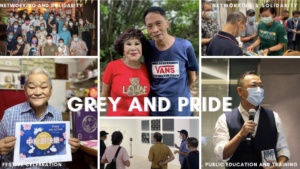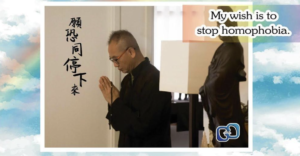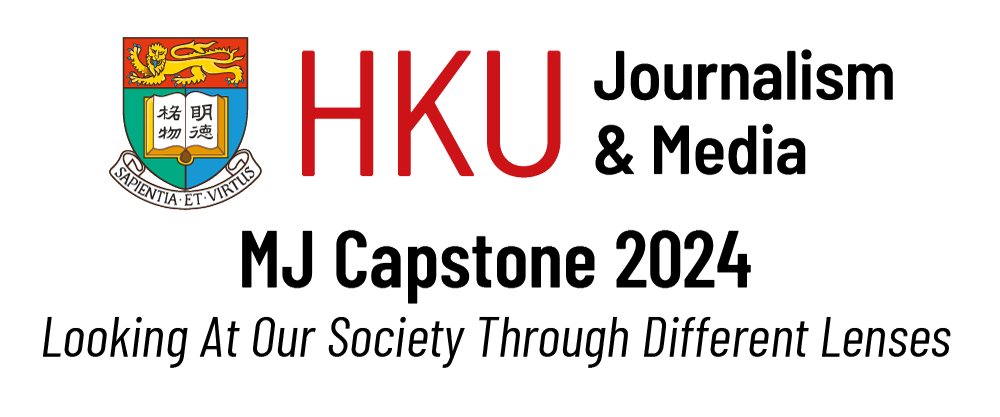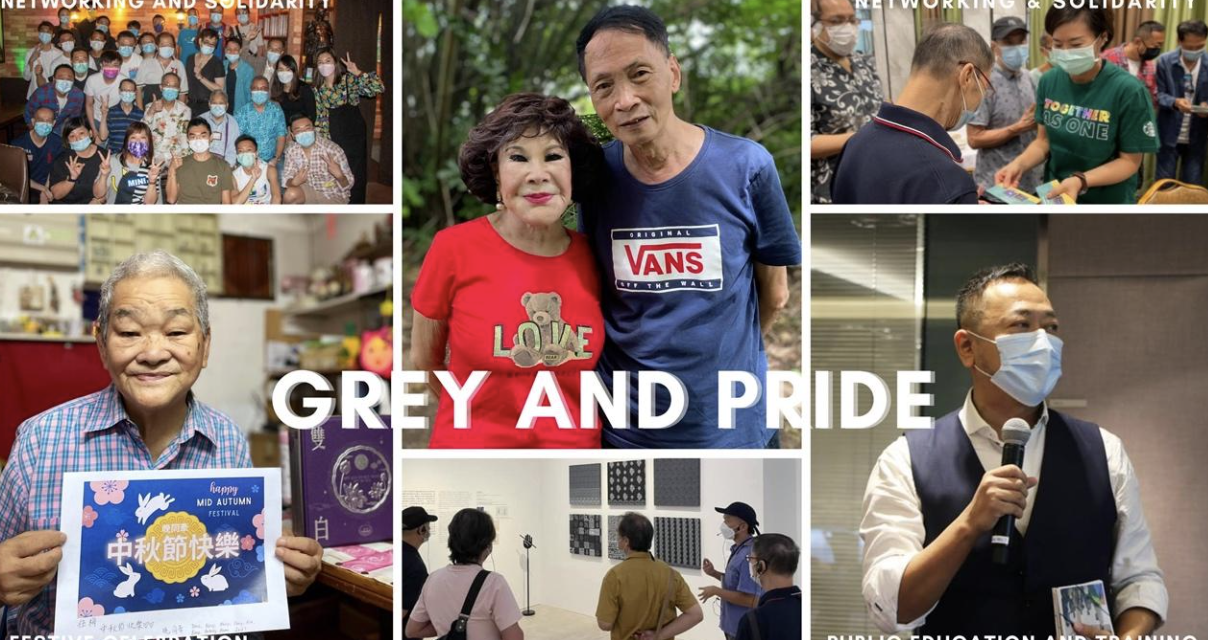By Sherry Cao Wangqi
HKU Journalism and Media Studies Centre
After over 60 years of personal struggle, Wale finally allowed himself to be gay in 2019.
He stopped being afraid to look into the eyes of another man, which he always avoided in the past. He posted a photo of Suk, Suk, his favorite gay movie on his social media page. He deleted the contact information of friends who had told him they hated gays. Most importantly, he divorced his wife.
“It’s thrilling to be myself. I didn’t dare to imagine this when I was young,” the 64-year-old said, smiling with wrinkles around his eyes.
Wale, who asked to be identified only by his English name to protect his privacy, is just one of countless elderly gay men in Hong Kong who chose to marry a woman, under enormous social or cultural pressure from outside and within.
Older “tongzhi” (comrades in Mandarin Chinese, a slang term for gay people) are one of the forgotten minority groups in the city, even as it goes through radical changes in the local LGBTQ landscape. Studies estimated that there are 50,000 to 110,000 older “tongzhi” who are over age 60 in Hong Kong.
While their voices were once suppressed and unheard, as Hong Kong society changes with time, they have gradually joined together, grown more confident and become more self-aware. More of them are also coming out of the closet, telling their stories, and hoping to see changes in their lives before they leave this world, according to those familiar with this community.
They live in “two worlds”
Ngai Tak Kin, a long-time social worker, is a core member of Midnight Blue, the first NGO in Hong Kong dedicated to building a mutual support network for male sex workers. He has observed that many older male “customers” they serve are married, or were once married to a woman.
“They actually live in two different worlds,” said Ngai, who prefers to be identified only by his first name.
Wale was one of them.
Although his marriage to his ex-wife was loveless and “pitiful”, Wale thought it was totally impossible to step into a gay-straight marriage when he was young, because he saw no alternatives.
“Basically, you have to carry on your family surname, get a decent job, get married, and have kids,” Wale said.
He believed that was the routine everyone should follow, or at least that was what his father told him to do.
His father, who would call a friend “faggot” behind his the back, hated gays. Since Wale discovered his interest in men, he didn’t dare to imagine letting his father know.
When Wale turned 30, his father introduced him to several women for dating, and Wale remained obedient and went on dates with them, and only refused once.
“My dad might have sensed his son was ‘abnormal’, but he couldn’t face it,” Wale said.
“Faggot” was a term widely used in the past when a gay man was seen on the streets in Hong Kong. Three decades ago, being gay was a sin in Hong Kong. Under the Male Homosexual Conduct law, the sexual behavior between two men was a criminal offense punishable with up to life imprisonment and it wasn’t decriminalized until 1991. Even now, it is still a sin in the eyes of Christian churches, which have strong local religious influence.
“For most of the gays I know, they all suppressed their sexual identities because they had to make a living,” Wale recalled. “There was no respect, no jobs for them if you were gay.”
Ngai pointed out that Hong Kong’s Christian churches “were the most homophobic” and have embedded the seeds of homophobia during children’s education process, as many kindergartens, primary and middle schools in Hong Kong have religious backgrounds. It was forbidden in the Lord’s Prayer to be gay, which is a verse that is read and recited by every student in the schools, he said.
“Can you imagine how tough it was for them (the gay men)? They were like wanted criminals,” said Ngai.
Older gay men like Wale who grew up in a much more reserved environment had to put on disguise, Ngai said. At work, at school, and when facing their family, they will not talk about being gay. But behind them, they live a secret life, constantly looking for male sex workers through anonymous websites.
The biggest quarrel happened between Wale and his father when he was 32. His father got mad at him and pressured him to get married soon.
Wale finally agreed. No matter how “bitter” it actually was, he managed to carry on the marriage and take up the responsibility of a father and husband. He mentioned that his friends even called him a “perfect dad.”
“It was completely a fake marriage. I tried to make up for cheating them, my family. I spent most of my money on them…But I know there is a gap (between us),” Wale said.
After his father died and after he divorced his wife, Wale still found it hard to come out to his son. Even this year, he has been avoiding the topic every time he met with his grown son, fearing that they might “break apart” if his son finally discovered that he’s gay and that this was the reason his parents got divorced.
He said that he has been thinking about confessing to his son recently, because he doesn’t want there to be a secret between them, as had happened between him and his dad.
“One day he will know, and maybe it’s time,” Wale said.
Joining hands, making changes
Fortunately, things have changed with time, Ngai noted. The Christians’ homophobic acts have directly led to the rise of the International Day Against Homophobia, Biphobia and Transphobia (IDAHOT) in Hong Kong every May 17.
In 2007, the first Pride Parade was held in the streets of Hong Kong, which turned into an annual LGBT parade, and then more international LGBT campaigns were held. Nowadays, no mainstream newspaper will dare to publish headlines so blatantly discriminating against the LGBTQ community, Ngai said.
“At least we all agreed not to do it in the face now,” Ngai said.
Wale finally divorced his wife five years ago. He told his wife everything and they made the decision together. He said that society has changed, which gave him the courage to come out, and it’s at least not that dangerous to be gay.
“I feel great to be myself again. I hope more gays can do so,” Wale said.
Although it’s no longer criminal to be gay, many older gay men in Hong Kong still live in fear of discrimination and isolation. They can vividly recall their life in the darkness, even as they try to rebuild their identities and intimate relationships with others.
But what’s clear is that more of them are accepting their own gender identity and being themselves.
Grey and Pride, the only organization in Hong Kong that serves and looks after the older tongzhi’s needs, has witnessed the changes among the older gay men since 2014.
“At first, there were only four of us. And before us, there was no group like this. It was really hard for our generation to take the step and come out as gay,” said Barry Lee, the co-founder of Grey and Pride. “But now a large group of 200 of us are proudly speaking out. Our members indeed made changes.”
It started as an older gay self-help group registered by only four elderly members, and has now turned into an organization consisting of over 200 older gay men in Hong Kong.
“As the elderly and gay, we join hands, happily going along.” This is the slogan of Grey and Pride.

An introduction picture showing the services Grey and Pride provides. (Courtesy: Grey and Pride)
“Regardless of your age and sexual orientation, you deserve to live without fear,” said Lee. He stated that their biggest mission is to empower every older tongzhi member to build together a more inclusive, diverse, and tolerant society where everyone can love freely.
In the past 10 years, Lee was touched by their members’ changes along with changing attitudes in the society. It started with Travis Kong, a professor and expert of sexual studies in Hong Kong, who published his interview with three of the group’s core members in 2014 and for the first time brought their challenging issues into the public eye.
“In 2014 when Travis made the interview, the people in his interview were still very closed and shy, and didn’t wanna come out. They minded their stories, and their faces or identity to be known,” said Lee.
However, after the interview, their personal stories received public attention, and the older gay men were surprised to find out that people were willing to listen to them.
“They felt that they could do something. More importantly, they can do something together. So we kept going,” Lee said.
In the past 10 years, their voices have become stronger and stronger. They have made videos and postcards, published books, and also held weekly gatherings, showing up in public events. Lee was particularly amazed to see the changes of several members, who have gained the courage to come out, and tell their stories publicly.
By sharing their experience, they have touched a wide range of audiences in the city and beyond. As once an unknown group of four, now they’re spreading the voices of older gay men to the world.

A postcard made by Grey and Pride members. (Courtesy: Grey and Pride)
Coming out in twilight
Mr. J, who prefers not to reveal his real name to protect his privacy, is one of the typical examples of the older gay men who have broken the silence. He started as an observer in Grey and Pride in 2014. For more than six years, he never showed his face in Grey and Pride’s Facebook photos. But in the past three years, he gradually gained the courage to show up in public.
It was not that easy, and resulted in a huge impact on his life.
“I came out, and my friends from the elders center said we’re not friends anymore,” said Mr. J.
What’s even sadder for him is being shunned by his beloved Pacific church, where he had served as a faithful follower for decades. Other followers changed the way they treat him after a newspaper reported on his story. He had to leave.
But Mr. J didn’t give up. He spoke out more. In Lee’s eyes, he was quite reluctant to attend small gatherings at the beginning, but now he is comfortable and relaxed in front of the public. In 2021, he asked to represent the organization to speak in a sharing session with a group of worried parents, whose young kids were gay.
“It surprised us all to see Mr.J acting like that,” Lee said.
He shared his stories, and he told the parents that it’s not the end of the world to be gay, and their kids still have a bright future ahead. This time, he received applause.
Later on, Mr. J even participated in the Hong Kong gay film Suk,Suk, or Twilight’s Kiss, as a supporting actor. The film depicts the love story of two secretly-homosexual older Hong Kong men who fall in love with each other in their twilight years. Although one of them was married and the other one was a widower living with his son and his family, their encounter sparks the suppressed desire in their heart and leads to an affair together.
“The movie helps more people to know about older gay men, and this is good!” Mr. J said.
When asked if he feared anyone would watch the movie and suspect he was gay, Mr. J said he didn’t care anymore.
After these 10 years, he is not someone who would hide his face in the group photos now.
Allies, rather than enemies
At the same time, “homowives”, wives who married homosexual men in Hong Kong, are also becoming unlikely partners in the effort to fight for gay people’s equal rights.
One of them is Flora, a 45-year-old woman who divorced her gay husband four years ago. Even though the couple broke up, they are now allies rather than enemies.
Flora, who asked not to reveal her full name to protect her privacy, accidentally found out that her husband was gay nine years after they got married. She was outraged at first and tore up their wedding photos into pieces.
But when she sat down and talked to her husband, she thought it would be better to solve the problem by speaking out about this issue.
“I know he was under great pressure from his parents, and he devoted a lot to our family,” Flora said.
She tried to understand her husband and realized that the needs of both gay men and their homowives should be addressed.
In 2015, a group of homowives became the first wives to attend Hong Kong’s annual Pride Parade. Several women, catching eyes with their different identities, were standing in front of the marching lines, holding up posters that read: “My husband is gay. I am in pain.”
This unique scene aroused strength in Flora. She stepped out of the shadow of her marriage and took her ex-husband to organizations for LGBTQ people, removing the knot in his heart. In 2022, she also became a volunteer manager for an online group consisting of more than 100 homowives.
“I told my daughter that her father is gay, but he still loves her with no difference,” Flora said.
She thinks it’s a common belief among the homowives group: If gay men are treated equally, and are free to openly marry another man, their painful stories will no longer happen again.
Can we see the future before we die?
Now, 10 years have passed since Grey and Pride was established. They have just celebrated their anniversary together, but there is not much time left for many of its members.
Lee sighed several times as he mentioned that some of the members had died. The rest of them are old.
“That’s why we want to act faster,” Lee said.
Changes indeed happened. Hong Kong now has more activities, self-help organizations and public events addressing gay issues, and that has helped change public opinion.
According to a 2023 survey by three universities, 60 percent of Hong Kong people now agree with same-sex marriage. The survey was conducted in 2013, 2017 and 2023, and the results show that over the past 10 years, the percentage of people in Hong Kong who favor protecting gay and lesbian rights have grown markedly, which indicates a more open attitude towards LGBTQ people, especially among young generations.
“For the younger generation, they now wish to have freedom to love as they have their freedom to choose what they really want to be. That’s a good point for sure,” said Ngai.
Yet some obstacles are seemingly unshakable.
At present, it’s still impossible for same-sex couples in Hong Kong to enjoy legal marriage, as the court clearly defines marriage as between “a man and a woman.”
Last August, the Court of Final Appeal rejected Jimmy Sham’s appeal for same-sex marriages. Sham, who was a pro-democracy and LGBTQ rights activist, married his male partner in 2013 in New York. He has been arguing for Hong Kong to recognise overseas same-sex marriages since 2018. However, the court called for an alternative framework that legitimizes same-sex unions, instead of granting equal marriage rights to same-sex couples, and asked the government to come up with a framework by 2025.
Besides this, the Hong Kong Pride Parade last year decided to hold the activity indoors to avoid breaching Hong Kong’s national security law. Before pandemics, outdoor parades were a common scene in Hong Kong. But in response to the anti-government protests in 2019, the authorities in China imposed the national security law on Hong Kong, which came into force in 2020, targeting “secession”, “subversion”, “terrorism” and “collusion with foreign forces”. After that, demonstrations on the streets have become rare.
At the same time, anti-LGBTQ lawmakers tried to stop the Hong Kong Gay Games from going ahead as planned in November 2023. They called it a “threat to national security” and argued that such an event subverted traditional Chinese values and should be banned by the government.
Lee was worried that he wouldn’t see the gay games and parades coming back at all.
“I fear that we’re heading backward,” he said.
What’s more, there is a lack of a social caring system for elderly LGBT along with the lack of protection law, which Lee discovered during his experiences working in social workers’ training. Grey and Pride provides training for social workers in Hong Kong, and during the process, they found ignorance and discrimination was almost “everywhere.”
When Lee asked if any client is LGBTQ in the caring centers, the answer was always “no”, and they often put LGBTQ elderly issues as low priority, giving them little time to train.
“How can you fix problems if you don’t even exist there?” Lee said.
“To be honest, there has been really low progress. But there is still hope,” said Esther Leung, the social manager of Hong Kong Marriage Equality, a Hong Kong group joined by people from all walks of life who are dedicated to fair treatment for same-sex couples and eliminating discrimination against them, while advocating for the government to develop laws to address LGBT+ equality.
Leung highlighted the importance of personal telling. She believes a single person can have unlimited power as long as they speak up, and calls for actions.
“When people come to me asking: ‘What can I do? I’m powerless.’ I would say go talk to your friends, your college or your family, just a little bit about this, maybe a news or a gossip or just a comedy. I would say that it’s powerful when you speak. Even just one sentence is much more powerful than our organization’s publications,” Leung said. “When someday those small personal powers join together, they can cut off the bigger power and even affect the decision of the government.”
Before that happens, a rosy future for the older tongzhi in Hong Kong seems still far away, she said.
Since he came out, Wale has been living apart from his family, but he doesn’t feel lonely.
“I have some older gay friends to chat with. My life is worth living,” he said.
Advisor: Cindy Sui

